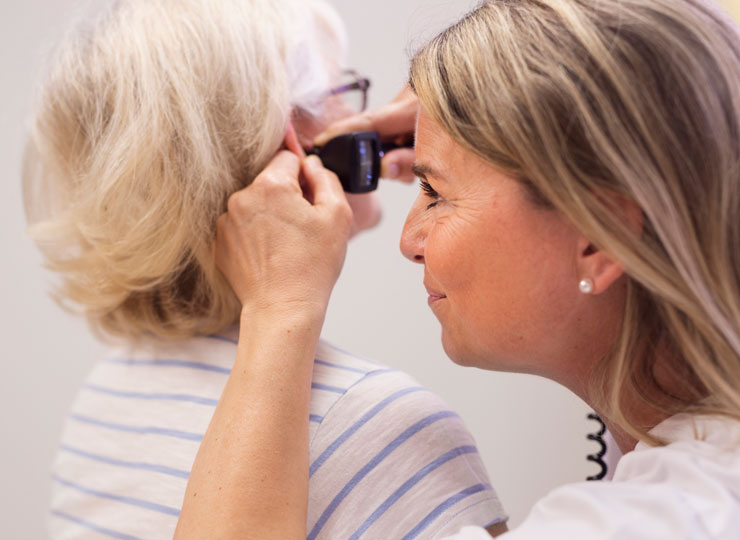
November 9, 2020
Could ear wax be impairing your cognitive health? By impairing your hearing, it might. And experts say that we might all benefit by taking note of this seemingly harmless substance that most of us give little notice to. Paying attention to ear wax may be especially important for anyone caring for someone with Alzheimer’s disease and older people who wear hearing aids.
Scientists increasingly recognize the importance of good hearing for brain health. In terms of modifiable risk factors for developing dementia, poor hearing has more of an impact than smoking, high blood pressure and lack of exercise. One analysis found that preventing or treating hearing loss in middle age has the potential to cut the likelihood of developing dementia years down the road by almost 10 percent.
Loss of hearing can contribute to social isolation, a known risk factor for Alzheimer’s disease and other forms of dementia. And even the mildest hearing loss, studies show, can take a toll on the brain.
Exposure to loud noise over a lifetime is a main reason for age-related hearing loss. But concerns have also been raised about ear wax, which can become impacted and dampen the ability to hear. Impacted earwax and loss of hearing can be a particular problem for patients with Alzheimer’s disease, impeding communication and worsening aggression and other difficult behaviors.
Ear wax has a high degree of “yuck” factor. But on its own, ear wax, known medically as cerumen, is basically a good thing, part of the ear’s self-cleaning mechanism that protects the ear by filtering out dust, germs and other objects from the delicate lining of the ear canal. Your body produces wax to protect the ears and prevent infections. And ear wax, along with skin cells and debris, is usually naturally expelled from the ear canal without causing problems.
Some people, however, produce more wax than can be easily removed from the ear. And as we age, ear wax can become drier and more likely to become impacted. Impacted wax can not only cause hearing problems, it may also lead to balance problems or dizziness which can contribute to falls, particularly in the elderly.
Older men and women, particularly those staying in long-term care facilities where medical care appointments are limited, are particularly likely to have a buildup of impacted ear wax. Buildup of excess ear wax can also occur in people who wear hearing aids, which can block the natural extrusion of wax from the ear canal.
This extra wax may harden in the ear canal and block the ear. When you try to clean the ear, by using a cotton swab, for example, you may instead push wax deeper and block the ear canal. Sharp objects can also damage the delicate lining of the ear canal or pierce an ear drum. For this reason, health care providers recommend against trying to reach into your own ear to clean it.
Every box of Q-tips comes with the warning: “Do not insert swab inside the ear canal. Entering the ear canal could cause injury,” including a punctured ear drum or damage to the tiny middle ear bones that are critical for hearing. Still, as any ear specialist who treats these injuries will tell you, people do it.
In most cases, simply letting warm water douse the ear, during a shower, for example, can help to soften and remove excess wax. Many other techniques and devices are sold for softening and removing ear wax, including drops and suction devices. They include oil-based compounds, like olive oil or almond oil or glycerol, and water-based compounds containing sodium bicarbonate or hydrogen peroxide. Your doctor can help you determine the best choice for you.
If there are large plugs of impacted earwax, a trained professional is the best bet for removing it. A professional can also help to determine whether other problems, such as sinus problems, may be contributing to hearing loss. Your doctor or an ear-nose-throat specialist assess the ear canal during regular checkups, especially if someone wears hearing aids.
Up to two-thirds of people living in nursing homes may suffer from impacted wax, according to the American Academy of Otolaryngology-Head and Neck Surgery Foundation. The group offers these additional tips for those concerned about ear wax:
*Most people do not need a regular schedule for preventing earwax buildup. Some people may need to have their ears cleaned at times. Your health care provider may find that you have too much earwax at your regular check-up. You may be treated at that time or sent to another provider for treatment.
*Hearing-aid users should have regular ear checks every three to six months. People with Alzheimer’s disease should also have earwax removed regularly.
*A professional may use an otoscope to look deep inside the ear to determine whether wax is impacted. — a device that can look deep inside the ear — to tell if cerumen is blocking the ear canal. Ear wax can usually be safely removed by softening it with water, saline or commercial ear drops and then through gentle syringing or manual extraction with a device called a curette.
The benefits may be immediate. One small study by Japanese researchers found significant improvements in hearing in older men and women with memory problems. They also scored higher on tests of memory and thinking skills.
By ALZinfo.org, The Alzheimer’s Information Site. Reviewed by Marc Flajolet, Ph.D., Fisher Center for Alzheimer’s Research Foundation at The Rockefeller University.
Sources: Tony Wright, “Ear Wax,” Review, BMJ Clinical Evidence, Mar. 4, 2015.
Saiko Sugiura, et al: Effect of cerumen impaction on hearing and cognitive functions in Japanese older adults with cognitive impairment. Geriatrics and Gerontology International, April 2014
Clinical Practice Guideline: Cerumen Impaction. American Academy of Otolaryngology-Head and Neck Surgery. January 2017.
Ksenia Aaron, Tess E. Cooper, Laura Warner, et al: “Ear drops for the removal of ear wax.” Cochrane Database Systemic Reviews, July 25, 2018











